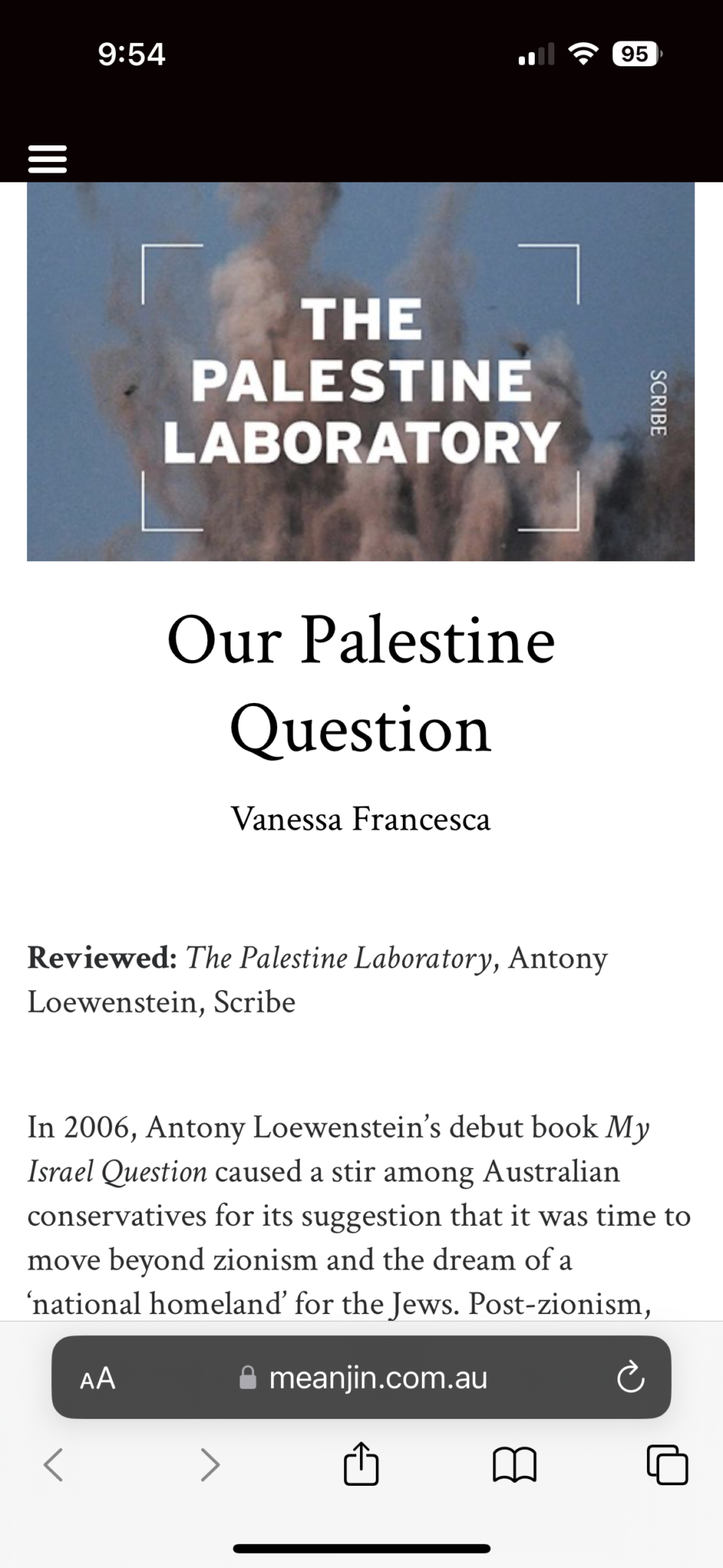A great review of my book, The Palestine Laboratory, in the literary journal, Meanjin, by Vanessa Francesca places my work in an historical context (and recognises the bulk of my writing over the last 20 years from Palestine to disaster capitalism):
In 2006, Antony Loewenstein’s debut book My Israel Question caused a stir among Australian conservatives for its suggestion that it was time to move beyond zionism and the dream of a ‘national homeland’ for the Jews. Post-zionism, Loewenstein argued, would mean operating beyond the logic of a ‘Jewish home’ for Jewish people and thinking about how a modern state can serve the aims of all its peoples without violent occupation.
Despite Loewenstein’s part in a changing global current arguing that anti-zionism is not synonymous with anti-semitism, My Israel Question was met with skepticism from the conservative media. He responded by expanding his thinking further afield, going on to publish books on the global drug trade, as well as what author of The Shock Doctrine Naomi Klein terms ‘disaster capitalism’. These works show how corporations around the world have tried to extract profit from human catastrophe. To Loewenstein, it’s clear that instruments of power are interconnected.
It is in this tradition of liberal journalism not afraid to look beyond one’s own borders that Loewenstein adds another book to his growing bibliography. In his compelling new work The Palestine Laboratory, he asks another ‘Israel question’, namely, how Israel has now moved into a form of political zionism that exports the technology used to oppress and coerce the Palestinian people in exchange for financial and diplomatic gain.
This extended twist on Shoshana Zuboff’s 2019 treatise The Age of Surveillance Capitalism provides the cogent argument that Israel is accomplishing in statecraft what Amazon, Apple, Google, Meta and Microsoft have achieved as multinational corporations: the extraction of human experience, in the form of data, in a project of monitoring and control that makes all of us—especially the occupied Palestinians who remain its test subjects—less free.
Through dedicated reporting and clear analysis, The Palestine Laboratory reveals several unsettling truths about this new and more insidious nationalist ideology. The first is the shadowy relationship between the Israeli government and its defence force, including intelligence agencies. Loewenstein tells us that Israeli spycraft is among the most notorious and sophisticated in the world. An example is Stuxnet, which used a computer virus to temporarily disable Iran’s uranium enrichment program and set back its development of a nuclear weapon.
What is eye-opening in Loewenstein’s book is how Israeli spycraft operates in tandem with its efforts to court its truculent neighbours, carried out by commercial entities with close ties to the Israeli government. Loewenstein shows the extent to which Arab states critical of Israel are willing to not only embrace their enemy but continue perpetuating the oppression of Palestinians in order to gain tools which they then use to oppress dissidents organising against their own political agendas.
A good example here is Pegasus, a phone-hacking spyware app developed by the NSO Group and purchased by states such as Saudi Arabia, in the lead-up to the murder of dissident journalist Jamal Khashoggi. But this is only the most infamous example of the proliferation of an intractable weapon that is as ubiquitous and insidious as the proliferation of small arms.
If the prevailing impression from Loewenstein’s Palestine Laboratory is that cyberweapons are here to stay, the sad truth is that so too is surveillance capitalism. And if The Palestine Laboratoryaccomplishes one thing, it is to show that the Palestinians are the canary in the coal mine of our diminishing freedoms. As essayist Rebecca Solnit has written, these structures that encroach on our freedoms tend to be so all-encompassing that they end up becoming a kind of ‘invisible cathedral’.
In our connected era, control of human experience is the new frontier of justice, especially in terms of what can be mined, extracted, enriched, analysed and monetised. We can see how power asymmetries between nation-states and their residents have become startling. Since 2015, Europe has employed ‘smart walls’ including motion sensors and facial recognition cameras to police their borders from asylum seekers deemed undesirable. In The Palestine Laboratory, Loewenstein refers to how South African apartheid was ended during the 90s by a vocal opposition who decided to band together to oppose a violent system. He argues that we are at another such watershed moment with surveillance capitalism in The Palestine Laboratory.
Just as there is yet no treaty to stop Israeli settlers from occupying Palestinian lands, there are yet no declarations of rights to stop governments and corporations extracting our private experiences and turning it into the basis of their hegemony. If surveillance capitalism is the reigning ideology of the twenty-first century, then we need to stop the proliferation of cyberweapons and the encroaching tyranny they represent. We need a reformation of the invisible cathedrals that politicise our private domains.
